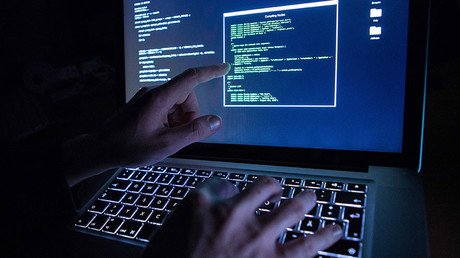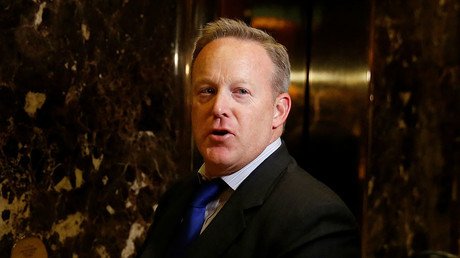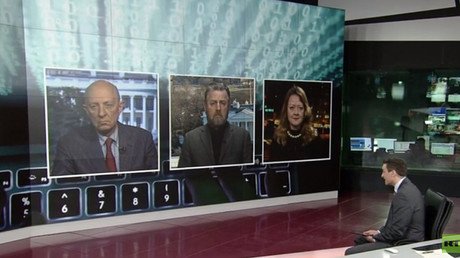‘Nothing but fake news:’ Kremlin dismisses claims Russia-linked hackers 'targeted Macron campaign'
Moscow has dismissed allegations suggesting it is involved in cyber attacks against the campaign of French presidential candidate Emmanuel Macron.
"It resembles the accusations made by Washington, which to this day remain hollow, doing no honor to the people making them," Russian presidential spokesperson Dmitry Peskov said, as cited by TASS.
On Tuesday, the Associated Press reported that Japan-based anti-virus research group Trend Micro said the campaign of Macron's En Marche! movement was "targeted by Russia-linked hackers."
The report quickly spread in the Western media, with many sensationally headlining their stories suggesting Russia's meddling in the French presidential campaign.
However, Trend Micro did not name Russia as being behind Pawn Storm, and neither linked the alleged Macron campaign attack to Moscow.
Moreover, in its 41-page report, Trend Micro mentions Macron’s name only once, amid the Pawn Storm group’s numerous "phishing campaign targets," without any mention of its alleged links to Russia.
READ MORE: Liberté d'expression? RT crew blocked from Macron HQ despite press requests
It says Pawn Storm, also known under several other names, including Fancy Bear, is an "active and aggressive espionage actor group" which launched phishing campaigns against Angela Merkel’s Christian Democratic Union (CDU) party in April and May 2016 and set up phishing sites that targeted ministries of the Turkish government as well as the Turkish parliament in early 2016.
"Another credential phishing site was set up to target the parliament of Montenegro in October 2016 — this was likely the work of Pawn Storm as well," Trend Micro says in the report.
The Japanese anti-virus firm said the Democratic National Committee (DNC) was also "allegedly hacked by Pawn Storm" in 2016.
"Stolen emails were published by WikiLeaks and a site called dcleaks[.]com, a domain very likely controlled by Pawn Storm," the report pointed out.
Russian citizens "are also targeted by Pawn Storm," the paper claimed, adding that "journalists, software developers, politicians, researchers at universities, and artists" fell prey to hackers.
"Several Russian media organizations (including mainstream media corporations) and foreign embassies in Moscow are common targets too."
According to Trend Micro researchers, Pawn Storm clearly has an "interest in influencing politics in different countries."
In its story on the report, AP said the Pawn Storm group has been accused by American spy agencies "of acting as an arm of Russia's intelligence apparatus."
Macron’s aide Mounir Mahjoubi said earlier, attempts to penetrate the candidate’s campaign date back to December, adding though that all of the intrusions were thwarted.
"It's serious, but nothing was compromised," he noted, as quoted by AP.
Peskov, President Vladimir Putin's spokesman, said Moscow would be "extremely grateful if this [cybersecurity] research group [Trend Micro] could send us some information [regarding the alleged attack] and we could check it out."
"As things stand now, it’s nothing but fake news," Peskov said.
READ MORE: MPs hint Russian hack was behind Brexit vote website crash… despite no evidence
Donald Trump’s Press Secretary Sean Spicer said earlier this year that there is “zero evidence” that Russia influenced the US presidential election.
“The way the mainstream media is playing this up is that [Russia] had an influence on the election,” Spicer said.
When asked about a report “on Russian malicious cyber activity” released by the FBI and the Department of Homeland Security (DHS) in late December in an effort to link Russia to hacking the Democratic Party organizations, Spicer noted that the 13-page report is first and foremost “a how-to manual for the DNC [Democratic National Committee] as to how they can improve their IT security.”
In January this year, the US intelligence community released the unclassified findings of its 'investigation' into what it says was Russian meddling in the 2016 presidential election.
The Office of the Director of National Intelligence (ODNI) released the report called “Assessing Russian Activities and Intentions in Recent US Elections.”
Former CIA agent Larry Johnson told RT that what had struck him most about the report is that it contained “not one shred of evidence” to back up the sprawling accusations against the Russian government.















